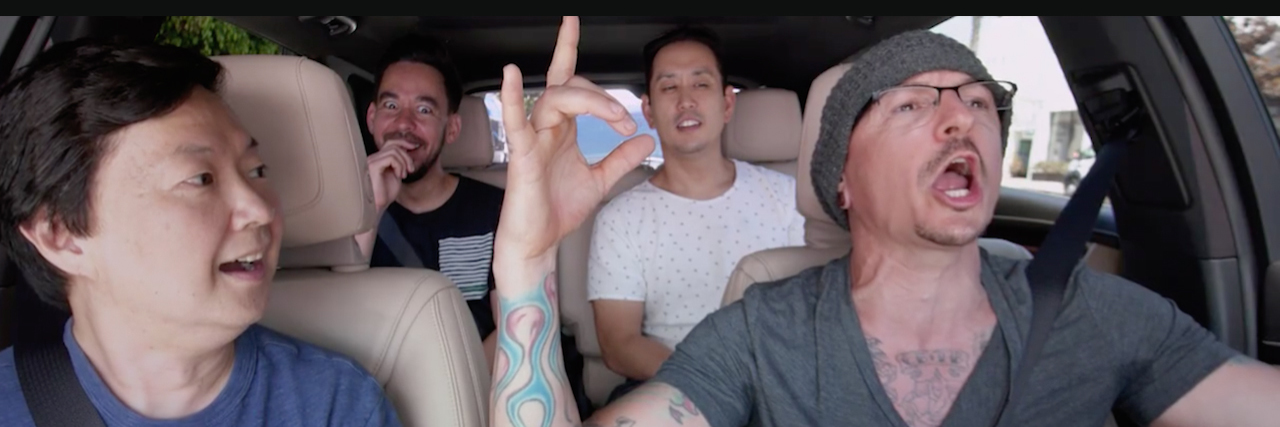Sometimes the news isn’t as straightforward as it’s made to seem. Sarah Schuster, The Mighty’s mental health editor, explains what to keep in mind if you see this topic or similar stories in your newsfeed. This is The Mighty Takeaway.
Editor’s note: If you experience suicidal thoughts or have lost someone to suicide, the following post could be potentially triggering. You can contact the Crisis Text Line by texting “START” to 741-741.
On Thursday, Linkin Park’s Facebook page released an episode of “Carpool Karaoke,” hosted by comedian Ken Jeong and featuring Linkin Park band members Chester Bennington, Mike Shinoda and Joe Hahn.
The episode was taped on July 14, six days before Bennington died by suicide.
I’ll be honest: it’s hard to watch, and I couldn’t get through the whole video on my first attempt.
In the episode, as “Carpool Karaoke” goes, the band sings along to songs and drives around Los Angeles, chatting with Jeong along the way. Bennington sings enthusiastically, laughs easily and smiles.
What’s extra heartbreaking about this video is that it confirms what I, and probably many of you, already know: depression doesn’t have a face, and suicidal thoughts are often easy to hide. Understanding this doesn’t make it easier to watch Bennington laugh and sing along to songs, knowing less than a week later his family’s, friends’ and fans’ lives would change forever.
This doesn’t mean Bennington didn’t show any signs of suicidality before his death. As people who don’t know him personally, we could never know what he was like behind the scenes. But this video is a window into the fact that he could pretend (at least, in front of a camera) that everything was all right — and so it was probably harder for those who did know him to pick up that something was wrong.
There’s also the possibility he was experiencing genuine happiness in this moment. That wouldn’t contradict from the fact that he was struggling. Even when someone is depressed and even when they’re potentially considering suicide, they can still experience moments of joy. His smile might be real, but that doesn’t make his depression less valid.
As suicide prevention activist Dese’Rae L. Stage, who runs the Twitter account @suicidemediabot, has tweeted, when someone who’s considering suicide spirits are lifted, that doesn’t necessarily mean they are no longer in danger.
FACT: When a suicidal person’s mood and spirits lift, he or she is STILL IN DANGER of death by suicide.
— Suicide in the Media (@suicidemediabot) September 16, 2017
If watching the Linkin Park carpool karaoke video is hard for you because you’re a fan, you’ve lost someone to suicide or you know what it’s like to struggle with suicidal thoughts, here are some things we want you to remember:
1. It’s OK to watch this video when you’re ready, or not at all.
If the video of Bennington is hard to get through, know you’re allowed to watch it on your own terms. Wait until you’re in a comfortable place. Recruit a supportive friend or roommate to watch it with you. Or if you’re like me and couldn’t get through the whole thing, that’s OK too. Hopefully this video will fill you with joy (it’s funny!), but don’t judge your reaction to it.
2. You are not helpless when you feel hopeless.
If you’re still feeling hopeless after Bennington’s death, you are not helpless. There are things you can do. Here are some places to start:
- Donate to the One More Light fund, created in Bennington’s honor.
- Learn the warning signs that might indicate someone is suicidal.
- Reach out to a friend you know who has a history of depression, trauma or abuse, even if they seem to be doing well.
3. Suicide is preventable. We can’t be discouraged.
We want to believe we will know when our loved ones are suicidal, but over and over again we are shown that knowing is not simple, and knowing sometimes isn’t enough. This powerful hindsight, which does us no good after the fact, is frustrating and discouraging for people who want to prevent suicide. If someone is actually acting happy before they kill themselves, how will we ever stop someone from taking their life?
It’s a somber reality, but it doesn’t mean we are doomed. That’s why we have to keep spreading stories of hope. That’s why we have to keep giving suicide attempt survivors a platform to speak. That’s why we must make it easier for people who experience suicidal thoughts to reach out for help. That’s why we have to continue building loving communities for each other. It’s heartbreaking to know we can’t save everyone, but we can try.
If you or someone you know needs help, visit our suicide prevention resources page.
If you need support right now, call the National Suicide Prevention Lifeline at 1-800-273-8255, the Trevor Project at 1-866-488-7386 or text “HOME” to 741-741. Head here for a list of crisis centers around the world.

